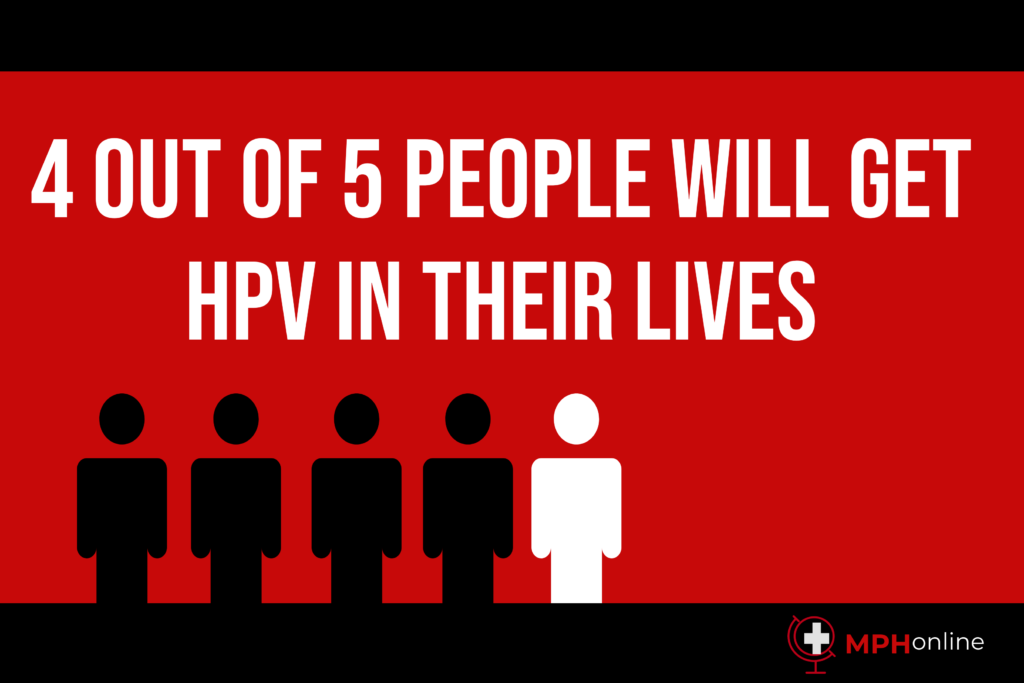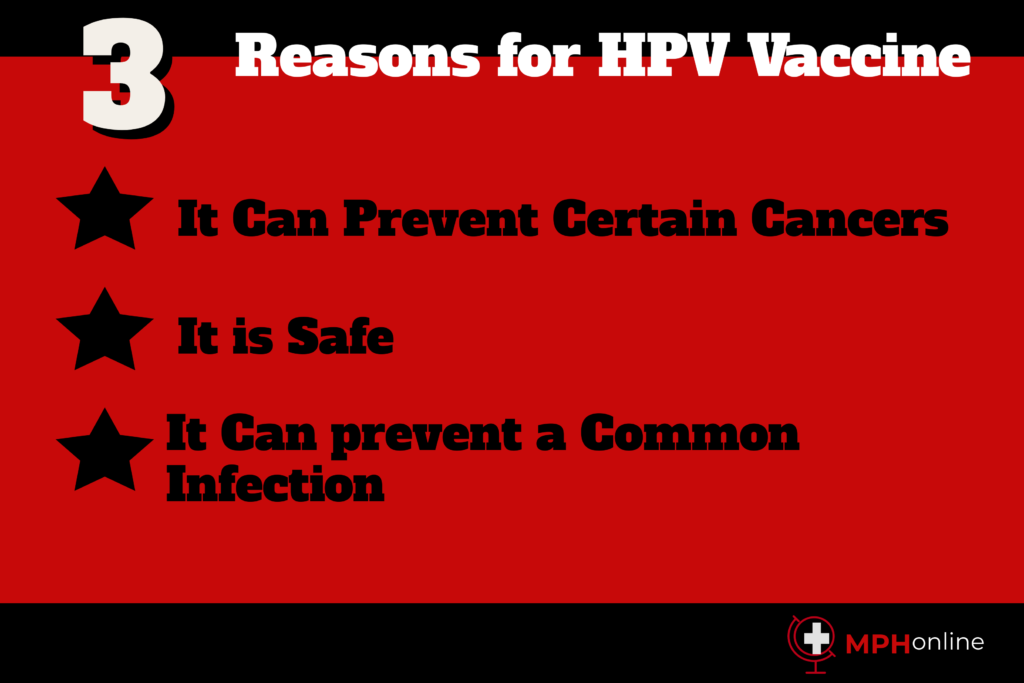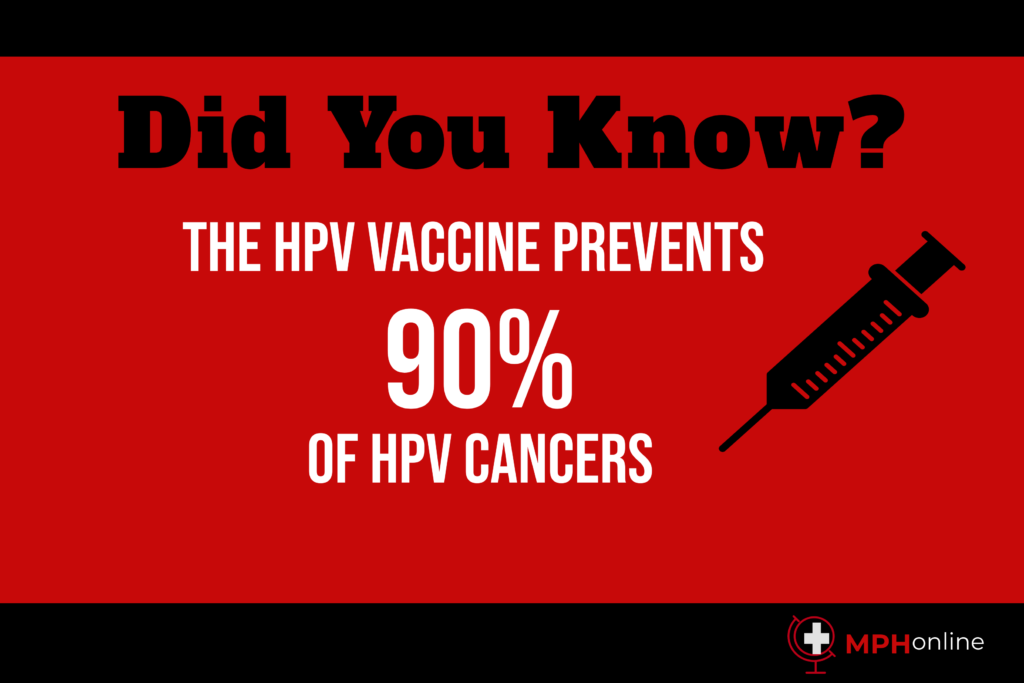HPV, or human papillomavirus, is the most common STI on the planet. This fact alone makes it not just a public health issue, but a global public health issue. The CDC estimates that at least 50% of all sexually active people will have HPV at some point in their lives. In addition, there are over 100 known types of HPV. This all points to why HPV vaccines are important for public health.
What Is the HPV Vaccine For?
Some people may not understand what is the HPV vaccine for or why get the HPV vaccine. This points to why education on HPV is important for everyone and why is there a vaccine for HPV to begin with. To understand what is the HPV vaccine for, it helps to understand some of the particulars about HPV in general.

HPV is an STI that can infect both males and females. The infection can spread from sexual contact as well as from skin to skin contact. As there are numerous types of HPV, there are also various potential symptoms. Those symptoms can include genital warts or blemishes, but there’s also the possibility of no symptoms showing up at all. The lack of visible signs of HPV is one of the things that makes the HPV vaccine so important.
The major danger of HPV is that it can increase the chances of cervical cancer and some other cancers as well. Preventing both the low level and high-risk complications from HPV answers the question of what is the HPV vaccine for.
Various types of HPV vaccines exist, but many people wonder is there a vaccine for HPV only when they find out about the infection and what it can do. Some may also wonder is there an HPV vaccine for specific types of HPV, or is there an HPV vaccine that’s different for different circumstances. Since HPV affects so many and often goes away on its own, some may also wonder why get the HPV vaccine at all.
The main problem with HPV is that it’s almost unavoidable. As a public health issue, HPV needs something to corral and control it. When asking what is the HPV vaccine for, it’s easy to see that it exists to help curb the spread of the infection and lessen its effects on individuals and the overall population.
Since the infection can go completely undetected for many, there’s a real danger of it unknowingly infecting many people before someone shows symptoms. In addition, the people most at risk for the worst types of HPV infections may have no internal protection from it should they end up catching the infection.
Is the HPV Vaccine Safe and Effective?
Many people are unsure of vaccines in general because they’re not sure about the relative safety and effectiveness of them. But, is the HPV vaccine safe? Is the HPV vaccine safe for everyone or only some people? All these and other questions concerning vaccines are important to help clue people into what they need to know about the HPV vaccine so they can choose to receive the vaccines with confidence and without fear.

Does the HPV Vaccine Work? How Does the HPV Vaccine Work?
The HPV vaccine consists of proteins that mimic HPV. This vaccine isn’t the same as HPV and doesn’t contain real samples of HPV. People aren’t injected with actual HPV when they take the vaccine. This is important to know for people who wonder is the HPV vaccine safe.
Once someone receives the vaccine, their body will start to make antibodies. Now that their bodies have the antibody information stored, those same antibodies will work to stop HPV from creating an infection if the person becomes exposed to the real thing. And while all that sounds good in theory, people will really just want to know does the HPV vaccine work and how effective is the HPV vaccine.
How Effective is the HPV Vaccine?
The HPV vaccine became a general recommendation in the United States in 2006. Since that time, scientists and health professionals have been able to note the effectiveness of the vaccine. According to the CDC, certain types of HPV infections have decreased by 86% in teenaged girls, and by 71% in women in their 20s. Fewer people overall are showing signs of genital warts.
Maybe most importantly, cervical precancers have shown a steady decrease. The CDC also notes similar results in other countries with these types of vaccination programs.
There are different types of HPV vaccinations, and all the ones tested and distributed have shown they’re safe and effective. However, as with any type of vaccination, there are some cases where the vaccine can create side effects as well as some cases when the HPV vaccine isn’t the right path for a certain subset of people.
What Are the Side Effects of the HPV Vaccine?
HPV vaccine side effects do exist, but the side effects of the HPV vaccine tend toward mild reactions. All vaccines can have side effects, and the HPV vaccine is no different. So, what are the side effects of the HPV vaccine? The most common side effects of the HPV vaccine include:
- Pain or swelling at the injection site
- Muscle or joint pain
- Fatigue
- Fever
- Headache
- Nausea
Other HPV vaccine side effects can exist as well depending on the specific type of HPV vaccine administered and individual health considerations of the person receiving the vaccine. More severe side effects, such as allergic reactions are also possible. Like many medications and vaccines, weighing the potential side effects against the benefits represents the main pros and cons of the HPV vaccine.
Pros and Cons of the HPV Vaccine
As stated, the HPV vaccine pros and cons do exist, and its the potential side effects of the HPV vaccine that drive them most. Some HPV vaccine pros and cons include:
Pros
- The vaccine is very good at protecting against the most common cancer-causing forms of HPV
- The vaccine can protect against other common forms of HPV, such as those that cause genital warts
- The vaccine can prevent other forms of HPV related cancer as well
Cons
- HPV vaccine side effects, although very serious ones are uncommon to rare
- The HPV vaccine is not effective against every form of HPV
When considering what are the side effects of the HPV vaccine, people should do their research into it and speak to their healthcare professionals first. Does the HPV vaccine work? Yes, it does. Nevertheless, the science is still ongoing regarding how effective is the HPV vaccine and public health officials are still studying the effects as well as the pros and cons of the HPV vaccine.

Is the HPV Vaccine Just for Women?
A major misconception about the HPV vaccine is that it’s just for women. Know that both men and women can contract, have, or pass along HPV. For this reason HPV vaccines for men is just as important as it is for women. However, HPV vaccines for men is something of a misnomer.
Males require the same series of HPV vaccines as females if they’re under the age of 15. The workings of the HPV vaccine in males is the same as how it works in females. However, the HPV vaccine for males will help protect them more from genital warts and anal cancer. So, there’s no specific male HPV vaccine, but there are types of the vaccine that work better for boys or men.
HPV vaccines for men work the same way as they do for women. The HPV vaccine in men will do the same job of preventing future infection and lowering the chance of certain types of cancers. Getting HPV vaccine in men is also important because men are more likely to not show symptoms of HPV infection.
With the HPV vaccine in males, there is less chance of someone asymptomatic infecting or becoming infected by someone else. If someone were to seek a male HPV vaccine specifically, they would likely find information concerning which specific version of the HPV vaccine for males will work best. Generally, healthcare professionals recommend the Gardasil or Gardasil 9 variety of HPV vaccines for men.
What Keeps People from Getting the HPV Vaccine?
The main reason someone would want to avoid the HPV vaccine is because of a lack of information on them. There is a lot to know about the HPV vaccine types and where to get the HPV vaccine.
Where Can I Get the HPV Vaccine?
Practically any healthcare provider can help to direct someone toward where to get the HPV vaccine. For many people, some types of HPV vaccines will already exist as part of their scheduled immunizations. This typically applies to children and young adults.
For people in their 20s and older who want to know “where can I get the HPV vaccine,” the answer is usually with their doctor, a Planned Parenthood, some pharmacies, and various other health centers. If in doubt on where to get the HPV vaccine, a quick search online is often all it takes.
As there are different types of HPV vaccine, it’s not always necessary to know everything about each of them. Still, some general knowledge of the main types of HPV vaccine available can help someone do research or make an informed decision. This is especially true as many healthcare professionals recommend people keep using the same types of HPV vaccines in a series, rather than switching between the different HPV vaccine types.
The more people know about HPV and HPV vaccinations, the better informed and better immunized the population becomes against it. This is why HPV vaccines are a serious public health concern, and why the public health field continues to make strides to figure out how to improve everyone’s protection against this very common type of infection.
Related:
Preventative Care and Public Health